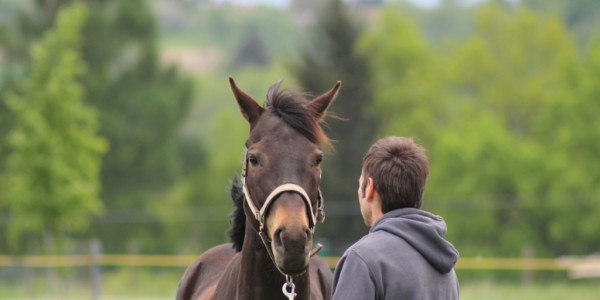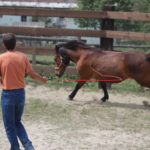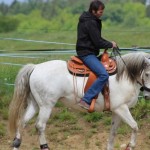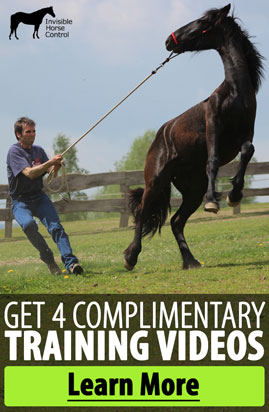How do horses communicate? When people communicate, they talk. People tell each other what they want to do, or what they want to avoid. Sometimes they tell the truth and sometimes they don’t.
Horses “talk to each other” a bit differently. They communicate by reacting on your behavior and by watching your reactions on their behavior.
Is he about to bite you?
For example, if your horse moves his head towards you and suggests that he might bite you he basically says
“I don’t like what you are doing, and if you continue I might bite you”
If you don’t react, your answer is most likely going to be interpreted as that you didn’t understand. if you move backward even a little bit as your horse threatens you and then don’t react anymore your horse will most likely understand it as you accepting his threat and listening to him.
If you react quickly, for example by smacking him with your hand, and saying no, your horse will understand it as something like “don’t try to threaten me”
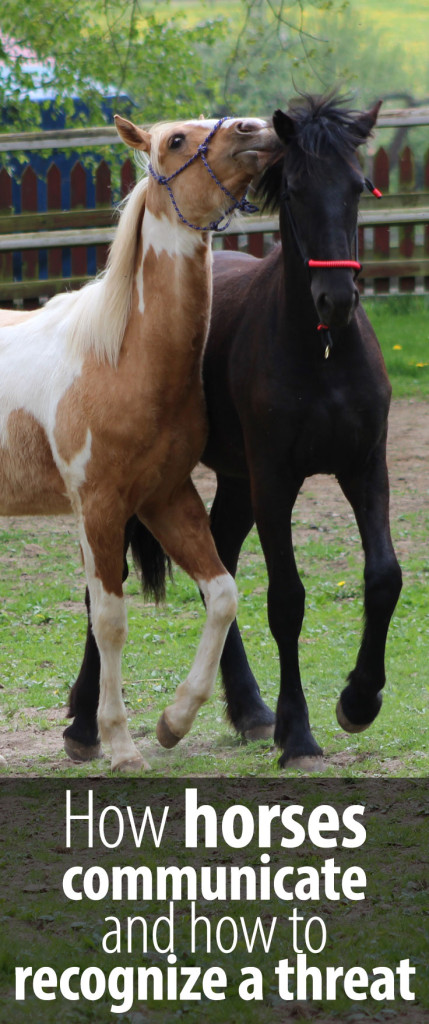
Pin this article on your pinterest!
Do I still have to respect you?
When you walk with your horse on a lead rope and he starts to go in front of you he is basically asking:
“Do I still have to respect you?” or “Are you paying attention to what is going on? Are you the leader with which I am going to be safe?”
So how can you answer him?
If you react within two seconds and make him back up two steps, back to where he was supposed to be walking, you basically tell him
“I am still your leader and I am paying attention to what is happening”
If you notice your horse getting in front of you and you back him up only after around five to ten seconds you basically say
“I would like to be your leader, but I am not paying attention to what is going on around and I am not sure whether you are going to be safe with me”
If you answer like this, your horse will keep asking you quite often whether you are still his leader and whether he should respect you. He might be doing it in different ways.
But if you don’t react as your horse gets ahead of you it basically means
“I am not your leader, and what you do is mainly up to you”
What difference does it make when you try to teach your horse something new?
Now let’s imagine a different situation. You are trying to get your horse to turn his head to the side as you pull a single rein. So you start slowly and gradually pulling the rein, and as you do, your horse starts thinking.
He doesn’t think about what you want, he is thinking about how to get rid of that pressure.
Often he will try to go against the pressure and turn his head to the opposite side. If you keep your hand steady, he will quickly discover that like that the pressure only gets worse.
Then he might try to raise his head to make the pressure go away. Then if you keep the pressure steady you tell him that that is still not the way to get rid of it. Then when your horse moves his head, even for a brief moment to the side that you wanted you should release the pressure.
That basically tells him that if he moves his head in that direction the pressure will go away.
If you release the pressure as you horse shakes his head, or raises it, you will be teaching him to shake his head as you pull the rein.
How do horses communicate when you are teaching them something new?
Every time you ask your horse to do something and he doesn’t react or doesn’t react correctly, it doesn’t mean that he is stupid. It can mean that he is asking you whether he still has to react like he always does, or whether he can react differently. Or it is even possible that you want something from him that is not capable of doing yet.
For example, when you want your horse to go on a circle in trot, and he is already getting a bit tired he might just stop in the center of the circle.
At that moment he is basically asking
“Isn’t it going to be better for me to just stop?”
If you can’t convince him to do at least one more circle so you can stop him yourself, you basically tell him that yes it is better for him to just go to the center and stop if he doesn’t want to go.
When you talk with people it might be difficult to tell whether they are telling you the truth.
Horses they always tell you the truth, even when it is not so nice.
(for example when your horse ignores you) However what your horse says or what he is asking is only valid for the moment. He is never making any promises or thinking about what is going to happen in an hour or in a week or even in a month.
It can be difficult to tell whether people say the truth, and with horses it might be difficult to tell what are they asking, or what are they saying, however, they never lie.
